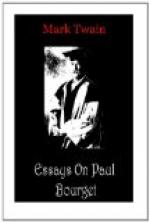A foreigner can photograph the exteriors of a nation, but I think that that is as far as he can get. I think that no foreigner can report its interior—its soul, its life, its speech, its thought. I think that a knowledge of these things is acquirable in only one way; not two or four or six—absorption; years and years of unconscious absorption; years and years of intercourse with the life concerned; of living it, indeed; sharing personally in its shames and prides, its joys and griefs, its loves and hates, its prosperities and reverses, its shows and shabbinesses, its deep patriotisms, its whirlwinds of political passion, its adorations—of flag, and heroic dead, and the glory of the national name. Observation? Of what real value is it? One learns peoples through the heart, not the eyes or the intellect.
There is only one expert who is qualified to examine the souls and the life of a people and make a valuable report—the native novelist. This expert is so rare that the most populous country can never have fifteen conspicuously and confessedly competent ones in stock at one time. This native specialist is not qualified to begin work until he has been absorbing during twenty-five years. How much of his competency is derived from conscious “observation”? The amount is so slight that it counts for next to nothing in the equipment. Almost the whole capital of the novelist is the slow accumulation of unconscious observation —absorption. The native expert’s intentional observation of manners, speech, character, and ways of life can have value, for the native knows what they mean without having to cipher out the meaning. But I should be astonished to see a foreigner get at the right meanings, catch the elusive shades of these subtle things. Even the native novelist becomes a foreigner, with a foreigner’s limitations, when he steps from the State whose life is familiar to him into a State whose life he has not lived. Bret Harte got his California and his Californians by unconscious absorption, and put both of them into his tales alive. But when he came from the Pacific to the Atlantic and tried to do Newport life from study-conscious observation—his failure was absolutely monumental. Newport is a disastrous place for the unacclimated observer, evidently.
To return to novel-building. Does the native novelist try to generalize the nation? No, he lays plainly before you the ways and speech and life of a few people grouped in a certain place—his own place—and that is one book. In time he and his brethren will report to you the life and the people of the whole nation—the life of a group in a New England village; in a New York village; in a Texan village; in an Oregon village; in villages in fifty States and Territories; then the farm-life in fifty States and Territories; a hundred patches of life and groups of people in a dozen widely separated cities. And the Indians will be attended to; and the cowboys; and the gold and silver miners;




